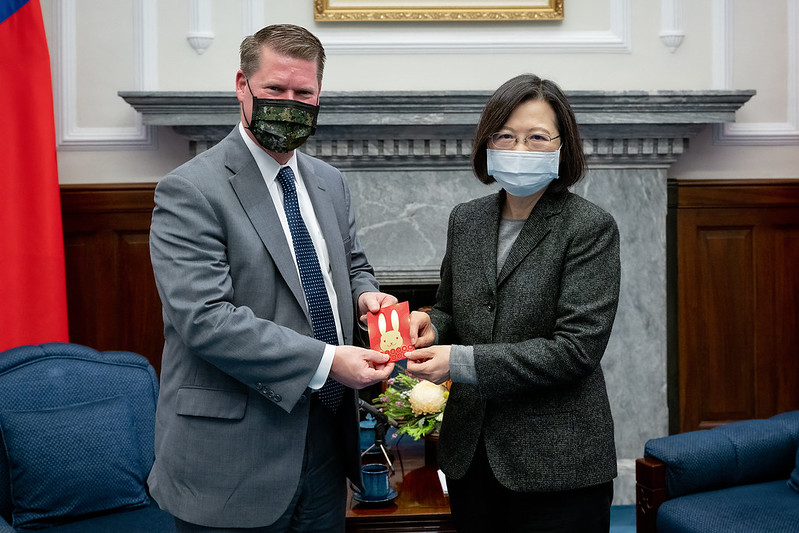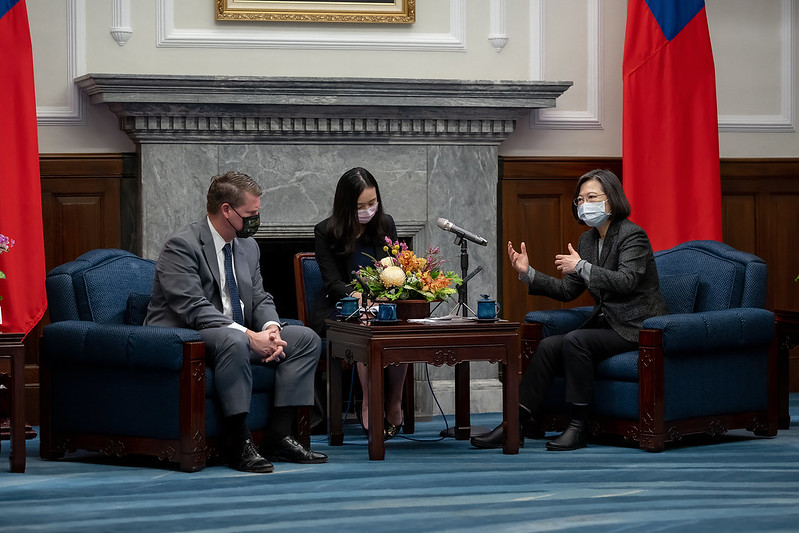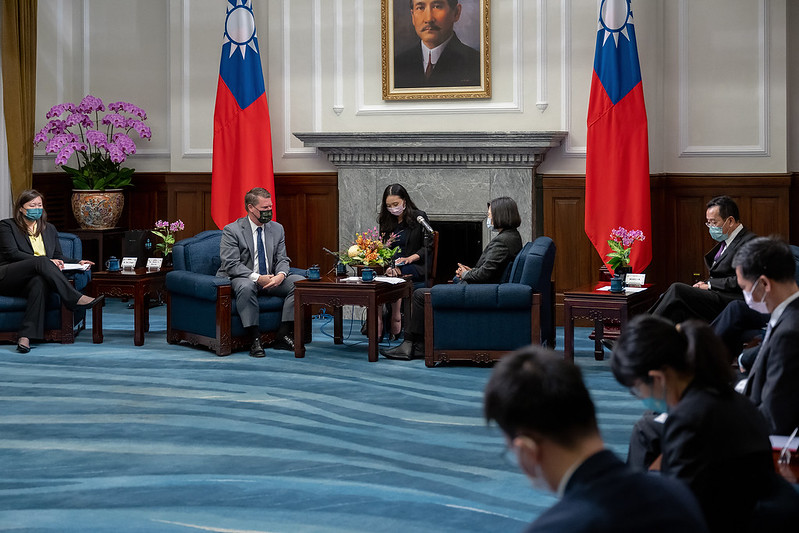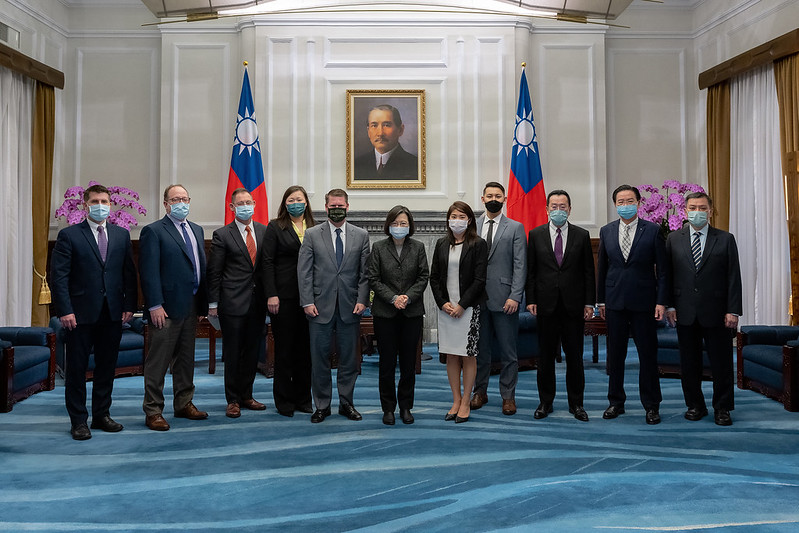News & activities
 News releases
News releases
On the morning of January 11, President Tsai Ing-wen met with a delegation from the Project 2049 Institute, a think tank based in Washington, DC. In remarks, President Tsai thanked members of the delegation for their attention to Taiwan-related issues and expressed confidence that this visit will facilitate future exchanges and cooperation between Taiwan and the United States. The president also said that Taiwan will continue to strengthen cooperation with the US across various domains in 2023 and that together we will contribute to a free, open, and prosperous Indo-Pacific.
A translation of President Tsai's remarks follows:
It is a pleasure to welcome another delegation from the Project 2049 Institute to Taiwan. I am delighted to see Chairman Randall Schriver, a good friend of Taiwan, and all the experts and scholars here today.
The last time I met with Chairman Schriver was in 2020. Over the past few years, as the world has faced challenges brought about by the global pandemic and expanding authoritarianism, Taiwan and the United States have supported each other in the fight against the pandemic and have continued to deepen cooperation in areas such as the economy, trade, and security.
The Project 2049 Institute has long observed security issues across the Taiwan Strait and the Indo-Pacific region; it has also frequently offered advice on Taiwan-US relations and security cooperation. I want to take this opportunity to thank all of you for your attention to Taiwan-related issues. I am confident that your visit will facilitate future exchanges and cooperation between Taiwan and the US.
Taiwan stands on the frontline of defense of democracy. We deeply understand that only by bolstering our defense capabilities and strengthening our economic and social resilience can we safeguard freedom and democracy, ensure national security, and maintain peace and stability in the region.
Recently, I announced our military force realignment plan, which reinstates a one-year term of mandatory military service and enhances training content and capacity. We also hope to strengthen cooperation with more democratic partners to jointly safeguard our shared beliefs and values.
Taiwan and the US are important strategic and economic trade partners. Over the past several years, the US has continued to announce arms sales to Taiwan, taking concrete actions to fulfill its security commitments to Taiwan.
Taiwan and the United States have continued to strengthen economic and trade relations through a variety of mechanisms for dialogue, such as the Taiwan-US Initiative on 21st-Century Trade, on which we will hold another round of talks this January 14. We hope that bilateral trade negotiations will yield further progress and more results.
In 2023, Taiwan will continue to strengthen cooperation with the US across various domains. Together, we will contribute to a free, open, and prosperous Indo-Pacific. I look forward to the views of the delegation. I wish you all a fruitful visit.
In remarks, Chairman Schriver expressed his thanks to President Tsai for taking the time to meet the delegation and commented on how wonderful it is to be back in Taiwan after such a long absence due to the circumstances. He added that they are delighted to return and discuss US-Taiwan relations and important world issues, issues for which they hope to serve as good partners by providing good solutions.
Chairman Schriver said that while he and his fellow members have been unable to visit Taiwan in person for some time, they have continued to watch and admire both the situation in Taiwan and President Tsai's outstanding leadership, noting our success in dealing with the pandemic, our support in the aftermath of the unprovoked invasion of Ukraine by Russia, and the support we have provided to Ukrainian refugees in Poland and elsewhere. In such examples, Chairman Schriver emphasized, Taiwan continues to be an excellent global citizen.
Chairman Schriver remarked that he has witnessed President Tsai's strong leadership in the face of pressure from China and the PLA (the People's Liberation Army), including military exercises and flights across the median line in the Taiwan Strait that occurred this week. He added that these are difficult challenges, but that President Tsai has proven more than capable in protecting our sovereignty, our interests, and all of what our people have worked so hard to achieve.
Good leaders must make tough decisions, Chairman Schriver said. In this regard, he mentioned the president's announcement to extend the term of service for conscripts in Taiwan to one year, a decision that he recognized as difficult but appropriate, given the threats that Taiwan faces. He also applauded the president's leadership on defense reform and said that he expects still more to come.
Chairman Schriver pointed out that the members of this Project 2049 delegation are all friends of Taiwan. He added that on the previous day the delegation engaged in discussions with Secretary-General Wellington Koo (顧立雄) of the National Security Council and later this evening will meet Foreign Minister Joseph Wu (吳釗燮). He also expressed his thanks to the diplomatic team and Representative to the US Bi-khim Hsiao (蕭美琴), whose efforts inspire the delegation members' enthusiasm for working on Taiwan-US relations, he said.
The current visit, Chairman Schriver said, is for education – he and his delegation intend to be better informed so that when they return to Washington and engage in routine activities, including working with Congress, the government, administrative teams, think tanks, and the media, they can provide their own views while also reflecting Taiwan's priorities and expectations for Taiwan-US relations.












